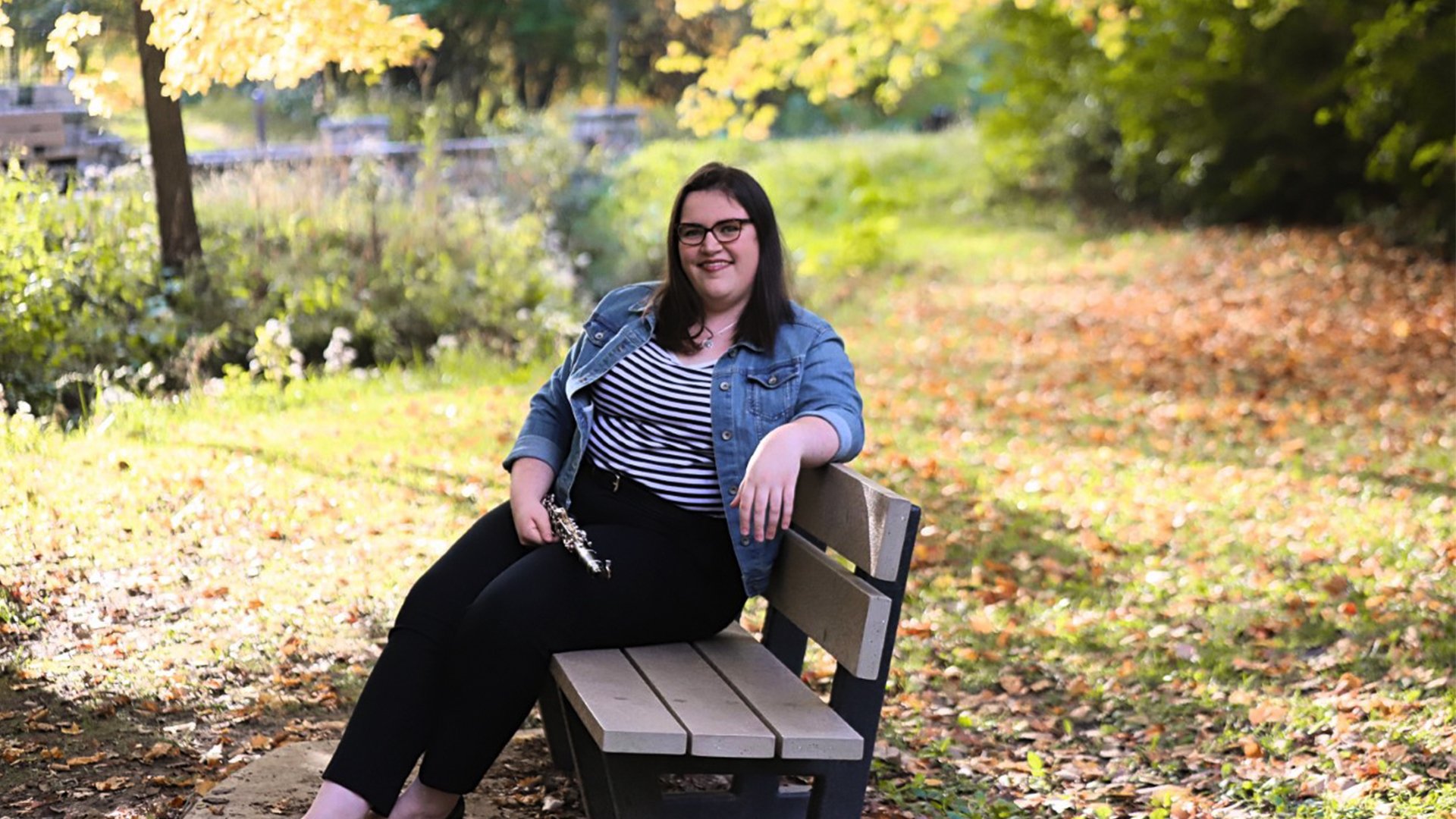

Class of 2020 Success Stories: Emma Stumpf shares the joy of music
Teaching music to students with sensory processing impairments leads to award-winning honors project
By Julie Carle
Emma Stumpf believes in the importance of music and arts in education. The May 2020 Bowling Green State University College of Musical Arts and the Honors College graduate turned a music education field placement into an award-winning research project that very well might have changed her life.
Stumpf of Clinton Township, Michigan, has been around music her entire life — from growing up in a house filled with her parents’ favorite ‘80s radio tunes to performing in school choirs and bands from grade school through college.
And because her mother is a teacher, the family spent plenty of time reading, writing and learning. With education established as an important part of their daily life, Stumpf decided early on that she wanted to teach.
“I need to figure out how to do this and help others learn how to teach this population."
However, it wasn’t until she was in a high school where music and the arts were valued that she realized music offered an answer to the question of what subject to teach.
After visiting the Bowling Green campus and interacting with music education and clarinet faculty members, she chose BGSU and the College of Musical Arts.
“I was pretty much sold,” she said.
Joining the Honors College added to her already great college decision. Her closest friends, all from majors outside music, and a majority of her activities — from student ambassador to student orientation leader — came about because of her affiliation with the Honors College. She enjoyed meeting prospective students and “shouting from the rooftops” that it is possible to be a musician and participate in the Honors College. “
When it came time to work on an honors project, she struggled with what to do. She didn’t want to write a paper, or compose music as other music students might have chosen. “What do I love doing?” she asked herself. Teaching was her response.
She decided to apply the lessons she learned during a community placement working with children who have emotional and behavioral health impairments.
At the time, she wondered, “How do you make music with someone who traditionally is not really able to participate in ways that I learned to teach?
"It’s all just been about making the best of where we are.”
She sat with them, played music with them, taught them violin, and quickly she earned their trust and their attention. They knew she would be back each week to interact with them.
“I loved those kids and couldn’t wait to work with them each week," Stumpf said.
Her “aha” moment came when she decided, “I need to figure out how to do this and help others learn how to teach this population."
And her honors project was born.
With the help of Drs. Lisa Martin, music education, and Alicia Mrachko, special education, College of Education and Human Development, Stumpf researched how to bring music into the lives of the students “who have sensory processing disorders and have a really hard time because music is loud and crazy and big,” she said.
She developed a day devoted to sensory-friendly musical experiences for students with any sensory processing disorder and their families. “It was such a great day,” Stumpf said. “I had so many parents say ‘we’ve never been to anything like this; we need more like this.’”
Both sessions were well-attended as she and approximately 10 of her music education peers presented musical storytelling, instrument exploration, music play, and books about music. She also created special spaces that had noise-canceling headphones and puzzles for participants who needed quiet time.
The instruments, equipment and materials to promote the event were paid for by a Center for Undergraduate Research and Scholarship (CURS) grant. Selected to present at the CURS symposium in April 2019, she shared videos, presented her report and won one of the top awards.
Her student teaching experience in Spring 2020 changed due to the global pandemic. She had to move to an online format, which is nearly impossible because music is very active and participatory.
“We were not able to make music together as a group, but we got really creative with assignments and assessments,” she said. The urban school district and her BGSU faculty supported her during and beyond the transition.
“It’s given me a couple of new skills to put on my resume,” she said, “And I’m much better on my computer. It’s all just been about making the best of where we are.”
Her initial plans to attend graduate school and continue her research about teaching music to students with sensory perception issues, went on the back burner for now because of the pandemic. Instead, she has decided to pursue a teaching job, and utilize her online skills if she has to.
"In everything Emma does, her passion for teaching and her love for music is at the forefront,” Martin said. “I’m so excited for her future students and to see all that she will contribute to the field of music education.”
Updated: 05/26/2020 08:40AM
